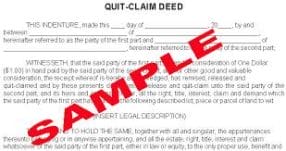Are you wondering, “how to file a quitclaim deed in California?” What’s the process? Well, this state, in particular, has different rules! So, pay attention closely, and I’ll clear up the confusion.
California is a gold mine when it comes to real estate and tax deeds, which are very popular with investors.
Today I’m going to answer the question, “how to file a quitclaim deed in California.”
However, in this case, we are searching for a quitclaim deed.
I’m Ted Thomas. Previously, I lived in California, and I’ve spent many years studying tax deeds in California.
Want to learn more about how to create wealth investing in real estate? Then take advantage of this FREE class that reveals the secrets of tax lien certificate and tax deed investing.
CALIFORNIA’S UNUSUAL RULES
The state of California has many unusual rules compared to the other 49 states.
For example, California will allow a property owner to remain in default on property taxes for 5 years before the county treasurer will take action and initiate a process to confiscate and seize the property.
Many properties are allowed as much as 7 years of defaulting and failing to pay local property taxes.
CALIFORNIA IS A TAX DEED STATE
 In the last 30 years, I’ve been involved as an investor in the trenches of tax deeds and tax liens.
In the last 30 years, I’ve been involved as an investor in the trenches of tax deeds and tax liens.
California is considered by most as a tax deed state, which simply means the local county will use a process that involves confiscation and seizure of the real estate for defaulted property taxes.
If the property owner fails to pay property taxes, they have forfeited their right in the property, and the county will continue to invoice the property owner for past due taxes.
After 5 years, the county will ultimately give notice, many notices, and registered letters, some delivered by the Sheriff’s Deputy. This is referred to as due process.
The county is announcing they will seize the property, and the property owner has been given due process. Finally, after 5 or 6 years, the county will post the property for auction on a tax defaulted property list.
WHEN DOES CALIFORNIA HOLD TAX DEED AUCTIONS
Local counties conduct tax defaulted auctions at least once a year. In many large counties, it’s twice a year. It’s the treasurer’s decision.
The auctions all have rules which are posted on the auctioneer’s site. They are also written on the treasurer’s site and sometimes written up in auction announcements.
FACTS ABOUT CALIFORNIA
California has the nation’s largest population. Everything is large. The state, the counties, and the size of the counties in square miles is huge.
It’s so big and so grand that San Bernardino County requires the Sheriff to have a fleet of airplanes to patrol the county. The distances are huge.
THE POWER OF THE TREASURER
Speaking of San Bernardino, a recent tax defaulted auction announced 3,100 properties available. After all day of auctioning, the treasure announced 1,600 real estate properties were unsold.
A good example of the power of the treasurer is as follows.
The treasurer announced a subsequent, second auction where the county would start the bidding at only $100. That’s how much power the treasurer has.
THE QUITCLAIM DEED PROCESS
 Today we are answering the question, “how to file a quitclaim deed in California.” This is a perfect example of the communication and confusion real estate investors have on a regular basis.
Today we are answering the question, “how to file a quitclaim deed in California.” This is a perfect example of the communication and confusion real estate investors have on a regular basis.
In this case, we are searching for a quitclaim deed. There is nothing quick about a quitclaim deed. A quitclaim is a process, and the document is titled Quitclaim Deed. Allow me to explain.
Counties, individuals, anyone can use a quitclaim deed. The process is simple as follows.
The grantor issues a quitclaim deed, and a grantee accepts the quitclaim deed. The grantor has now released all claims to the property and all claims to the title.
Many counties will use a quitclaim deed thereby disclaiming any problems with the structure and also disclaiming any problems with the title. The grantee has now accepted all of the problems with the property.
Counties regularly use a quitclaim deed, although some use a Treasurer’s deed or a Sheriff’s deed, however, they will put a clause in the deed that disclaims all responsibilities. Buyer Beware.
This is a normal transaction for the county, but not so normal for the amateur untrained uneducated investor.
ABOUT TITLES AND DOCUMENTS
A quitclaim deed is available at a stationary store, an attorney’s office online, and a title company.
This deed has power and needs to be understood.
Buyers and sellers should make themselves aware of the property title rules and documents.
California regularly uses deeds, which they call Grant Deeds, as they transfer a property from one entity to another.
There is considerable confusion with buyers, sellers, and investors regarding deeds and regarding trust deeds, which are really loans, Quiet Title and Quitclaim Deeds.
Most auctions and most counties will take advantage of a quitclaim deed, and the quitclaim deed will have a clause where they substantially limit their liability.
The point is that the uneducated investor may assume they are buying clear tile and a building structure that is okay.
The quitclaim deed disclaims any responsibility for title and for the structure.
Savvy investors will purchase tax defaulted properties and understand that a quiet title will be necessary. Otherwise, the new purchaser will have difficulty purchasing title insurance .
CONCLUSION
 Quitclaim deeds are available at stationary stores, attorney’s offices, and title companies.
Quitclaim deeds are available at stationary stores, attorney’s offices, and title companies.
The process itself is quite simple, even though it’s not fast. The grantor issues the quitclaim deed. The grantee accepts it, then the grantor has released all claims to the property and title.
Counties often use quitclaim deeds to disclaim problems with the property and the title once you’ve purchased a property at a tax sale, so be careful. There could be issues.
Do your due diligence on a property before you buy it, and understand that a quiet title will be necessary to ensure that the title is clear.
When you’re investing in tax defaulted property, it’s important to know the rules and do your homework to avoid making costly mistakes. I can show you how to do this safely, securely, and successfully.
For over 25 years, I’ve been teaching students how to invest in tax lien certificates and tax deeds, and many of my students have gone on to earn 6-figure incomes within a year of finishing the training.
I offer full support and a complete training with home study courses, Q&A sessions, live tutorials, workshops & web classes, and personal one-on-one coaching.
If you want to learn more, I can teach you how to make lucrative profits from tax lien and deed investing.
To get started quickly, I suggest you act now and begin with my FREE Master Class. It costs you nothing, and if not now, when? Why put off changing your life when you can do it today?




